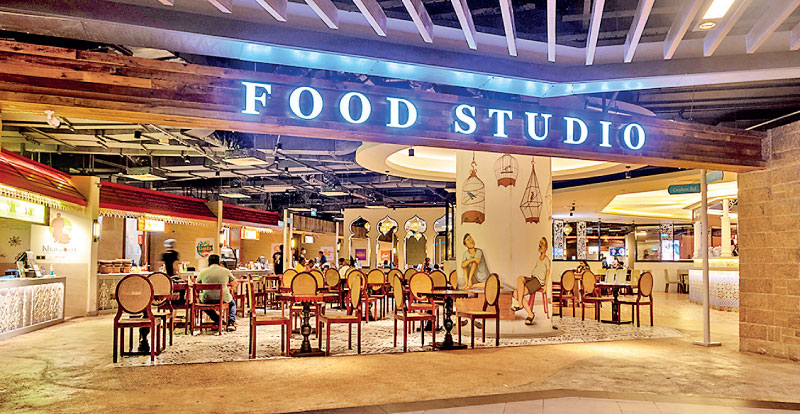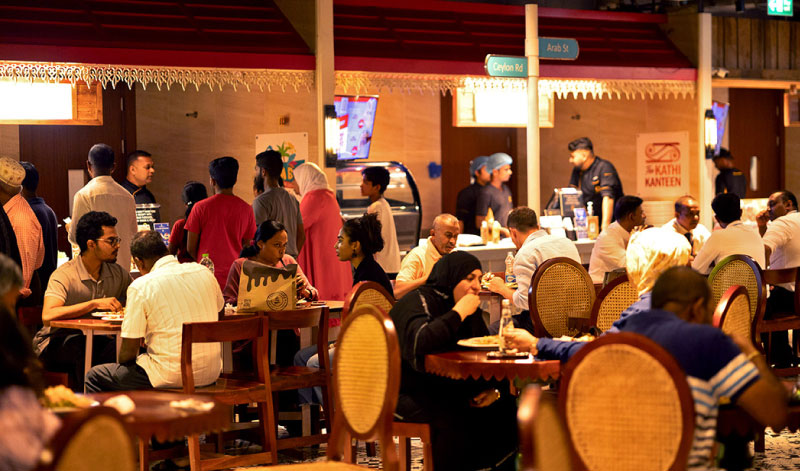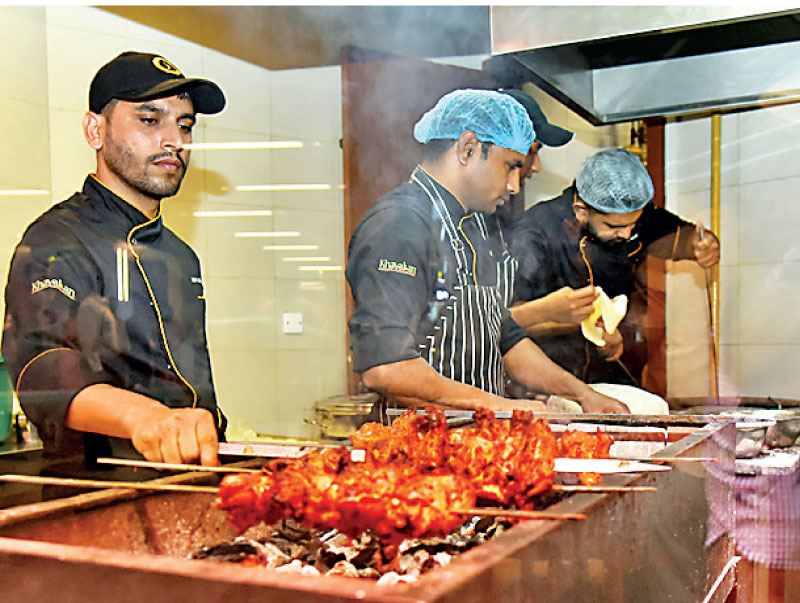Tuesday Feb 17, 2026
Tuesday Feb 17, 2026
Thursday, 21 September 2023 01:43 - - {{hitsCtrl.values.hits}}

Managing Director and Vice Chairman Naveed Cader

Director and Chief Executive Officer Nadeem Rajabdeen

In the dynamic world of culinary innovation, where trends often come and go, Food Studio stands tall as a testament to transformation and excellence. As they celebrate their fifth anniversary this September, it is clear that it is not just any food court management company. Food Studio has evolved into a culinary powerhouse, crafting its own food concepts and revolutionising the traditional notion of food court fare. With almost all of their 14 food brands within their food court being proprietary, it is evident that they have taken ownership, quite literally, of the dining experience. Boasting a workforce of over 200, they have demonstrated that their restaurants aren't just owned but meticulously operated by them, underlining the magnitude of their culinary empire.
However, their vision extends beyond delicious dishes; Food Studio aims to be an incubator for culinary creativity, nurturing talent, and providing the support needed for aspiring chefs to flourish. They strive to “inspire and enable the growth of food startups, drive culinary excellence, support sustainable practices, and create a positive impact in the food industry.” With their upcoming tagline "Beyond the Plate" poised for launch, Food Studio's five-year journey is more than just a celebration; it's a testament to their vision of culinary artistry. In this interview, we sit down with the Managing Director and Vice Chairman, Naveed Cader and Director and Chief Executive Officer, Nadeem Rajabdeen to delve deeper into their remarkable journey of culinary transformation. Excerpts:
Q: What motivated the inception of Food Studio, and what specific unmet needs did you aim to address with its launch, setting it apart from existing ventures in the market?
Naveed: Food Studio was born out of a shared passion for exceptional food experiences. In Sri Lanka, we identified a gap where access to high-quality, yet affordable cuisine at food courts was limited. The existing mall culture in Sri Lanka sparked our initial idea to bring something new to the dining scene.
Through discussions with my co-founder Nadeem and our founding chairman, Lim Tai Toon, we recognised the opportunity to create a space that would redefine dining expectations. This insight became the driving force behind the establishment of Food Studio.
Our primary objective was to provide an affordable yet authentic culinary journey to our patrons. We aimed to disrupt the conventional notion of dining out, which often revolved around fine dining experiences. By pooling our collective passion for food, we envisioned Food Studio as the answer to this unmet need in the market.
Q: What is the Unique Value Proposition that distinguishes Food Studio from conventional food court offerings and propels its innovative presence in the culinary world?
Nadeem: What sets us apart at Food Studio is our commitment to reimagining the traditional mall food court experience. While South East Asia, especially places such as Singapore, has been a reference point for mall food culture, we saw an opportunity to bridge the gap between fine dining and standard food court fare.
Many food enthusiasts prefer dining at standalone restaurants or hotels because of the higher quality of food and beverage offerings. Our vision was to create a unique hybrid model that combines affordability with exceptional cuisine from around the world. This distinctive positioning allows us to be considered a dining option rather than just a food court.
In the malls where we operate, we serve a diverse range of customers with varying disposable incomes. Our approach involves identifying and offering different cuisines while maintaining a commitment to using high-quality ingredients across a range of price points. This approach has not only allowed us to cater to a wider range of customers but also fostered innovation in our offerings.
For instance, even though sushi is typically associated with upscale restaurants and not considered a staple of food courts, we have made it available at Food Studio. This required us to be innovative in sourcing and presenting ingredients that would appeal to a wide range of customers, further distinguishing us in the market.
Naveed: Historically, food courts here were associated with fast food and lacked a focus on quality. When Sri Lankans travelled abroad, they often enjoyed dining at mall food courts, which offered a diverse and quality-driven culinary experience. Recognising this gap in the local market, we were inspired to introduce a similar concept in Sri Lanka, which fueled our enthusiasm for launching Food Studio as a company. Our aim was to redefine the perception of food courts by offering high-quality, diverse cuisines in a mall setting, aligning with international dining experiences that many aspire for.
Q: In marketing your outlets, especially those featuring non-conventional cuisine and offerings, have you encountered significant challenges in appealing to the masses, given their preference for traditional favourites?
Naveed: As a food court operator, our goal is to be accessible to everyone. However, many Sri Lankans are traditionally accustomed to certain dining preferences. Convincing them to try something new at our outlets Khayaban or Manoli, could be a challenge. Fortunately, with the growing exposure through social media and the evolving food and beverage culture in Sri Lanka, we have gradually overcome this challenge.
Nadeem: Marketing outlets that offer non-conventional cuisine have indeed posed challenges. The food and beverage sector in Sri Lanka is saturated, especially post-pandemic, with a variety of dining options, including traditional hotels and standalone restaurants. Creating awareness amid this competition could be tough. However, the mall culture has improved, and people visiting to shop or for entertainment often look for dining options in that space. We leverage this foot traffic advantage.
To entice customers to try something new, we have introduced sampling and tasting initiatives within the food court. Additionally, we utilise social media to provide informative content. Building awareness and getting customers to choose us as a dining destination are ongoing efforts, but we believe, with consistent quality and a continued presence, we will gradually gain momentum and acceptance among the various consumer segments.
Q: How does Food Studio stay ahead of the curve in aligning its cuisines and outlets with current food trends and customer preferences in the business landscape?
Naveed: To stay aligned with global food trends and customer preferences, we have taken a proactive approach. We have established a separate entity called Big Studio Private Limited, where we collaborate with consultant chef Jesse Aston. His primary role is to lead research and development (R&D) efforts, helping us continually evolve our brands to remain in sync with international culinary trends. Here at Food Studio, we share a genuine passion for food, which fuels our R&D initiatives. We engage in daily discussions, maintaining open communication to ensure that our offerings stay relevant and exciting.
The food court environment serves as an excellent tasting ground. While traditional cuisines like Chinese and Thai are generally well-received, we continuously work on enhancing and authenticating their offerings. We also experiment with newer concepts like Bamboo Boy, a noodles and dumplings brand, which has gained traction in a relatively short time. Data analytics play a significant role in our decision-making process, helping us refine and innovate our offerings while staying attuned to global culinary trends.
Nadeem: Our approach has evolved beyond personal preferences, considering how a particular cuisine or product will be received by various demographics. We assess how different groups of people, with varying tastes and preferences, respond to a new addition. This requires thorough research and analysis before introducing any new concept.
Q: Considering the substantial impact of the COVID-19 pandemic and the various challenges encountered over the years, could you share how you successfully navigated these hurdles and maintained your position in the industry?
Naveed: Faith, hard work, and teamwork. Everyone played a vital role. It needed taking calculated risks and having the courage to weather the storm. There's no one-size-fits-all solution, but we attribute our resilience to a blend of luck, unwavering faith, and dedication, starting from our team members and chefs who have had the confidence to stay with us.
We consistently engaged in planning, daily assessments of key metrics, and strategic thinking to stay afloat in preparation for worst case scenarios, which happened including the Covid pandemic, and the financial crisis. We had to adapt not only from a financial perspective but also in terms of managing supply chains and responding to changes in the broader economy.
Nadeem: Many obstacles forced us to reevaluate our strategies and continuously adapt and evolve. Instead of using a one-size-fits-all approach and wondering why challenges were occurring, we returned to the drawing board. We identified areas where we needed to think beyond our previous methods. These challenges prompted us to consider how we could mitigate risks and operate differently while remaining in the same business. Our ability to identify these areas for improvement and innovate in response to challenges has been instrumental in our resilience and growth.
Q: In the highly competitive food industry where many restaurants face setbacks and closures, achieving five years of continuous success is a remarkable feat. Could you highlight some of the key milestones Food Studio has achieved during this time?
Nadeem: In a food industry that is ever-evolving and competitive, our milestones are an ongoing process as we strive to remain relevant and resilient. Much of our success is attributed to strengthening our back-end processes, which has allowed us to operate effectively. We have made substantial progress in these areas that contributed to our current operational success. However, we still have more to achieve as we continue to scale our operations.
Naveed: I wish to emphasise the role of empowerment in our journey. We have empowered our chefs, ensuring that they have the training and exposure needed to excel. They are not just culinary artisans but key contributors who feel a sense of ownership in what we do. This approach extends beyond the kitchen and permeates our entire organisation.
Running a food and beverage outlet requires more than just focusing on profit and loss statements. It's about fostering a sense of teamwork, empowerment, leadership, and ownership throughout the organisation. These values have been ingrained in our team, which, in turn, translates into the quality of our food and the success of Food Studio.
Q: Could you outline Food Studio's expansion plans, including new locations and potential diversification of offerings in the coming years?
Nadeem: Currently, we have several expansion plans in the works, and I would say Naveed has even more ideas up his sleeve. Our immediate focus is on opening Havelock City, which will position us well with food courts in three of the largest mixed developments, establishing us as a leader in this space.
Looking ahead, we are exploring both horizontal and vertical growth strategies. Horizontally, we plan to expand to locations with strong mixed developments when opportunities arise. We are also considering taking some of our brands outside of food courts and into standalone spaces, not only in the city but also in tourist hotspots across the country. The timing for this expansion depends on various factors, including development timelines.
Vertically, we are keen on diversifying our revenue streams while remaining relevant to our core business. This includes reevaluating our supply chain and exploring ways to become more involved in it. By taking control of certain aspects of the supply chain, we hope to improve cost efficiency, quality control, and economies of scale. This would not only benefit our food courts but also open opportunities to supply goods to the wider food and beverage industry.
Centralising our processes is another significant step we are planning, including the establishment of a central kitchen. This would enhance consistency and streamline operations, allowing us to dispatch precisely what is needed to all three food courts. Currently, we manage 14 outlets in each food court, and centralisation will play a pivotal role in improving quality, consistency, cleanliness, and efficiency.

